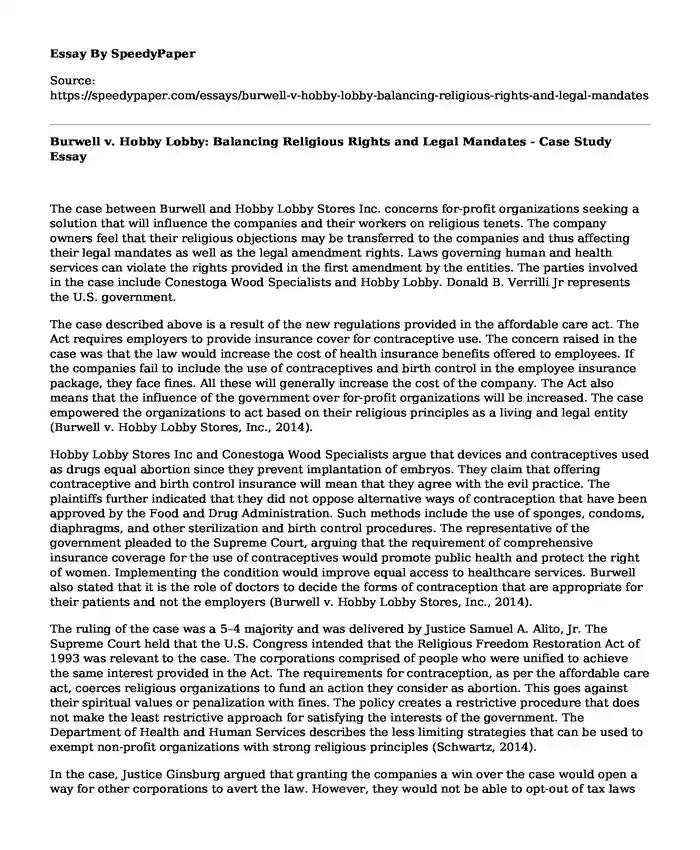The case between Burwell and Hobby Lobby Stores Inc. concerns for-profit organizations seeking a solution that will influence the companies and their workers on religious tenets. The company owners feel that their religious objections may be transferred to the companies and thus affecting their legal mandates as well as the legal amendment rights. Laws governing human and health services can violate the rights provided in the first amendment by the entities. The parties involved in the case include Conestoga Wood Specialists and Hobby Lobby. Donald B. Verrilli Jr represents the U.S. government.
The case described above is a result of the new regulations provided in the affordable care act. The Act requires employers to provide insurance cover for contraceptive use. The concern raised in the case was that the law would increase the cost of health insurance benefits offered to employees. If the companies fail to include the use of contraceptives and birth control in the employee insurance package, they face fines. All these will generally increase the cost of the company. The Act also means that the influence of the government over for-profit organizations will be increased. The case empowered the organizations to act based on their religious principles as a living and legal entity (Burwell v. Hobby Lobby Stores, Inc., 2014).
Hobby Lobby Stores Inc and Conestoga Wood Specialists argue that devices and contraceptives used as drugs equal abortion since they prevent implantation of embryos. They claim that offering contraceptive and birth control insurance will mean that they agree with the evil practice. The plaintiffs further indicated that they did not oppose alternative ways of contraception that have been approved by the Food and Drug Administration. Such methods include the use of sponges, condoms, diaphragms, and other sterilization and birth control procedures. The representative of the government pleaded to the Supreme Court, arguing that the requirement of comprehensive insurance coverage for the use of contraceptives would promote public health and protect the right of women. Implementing the condition would improve equal access to healthcare services. Burwell also stated that it is the role of doctors to decide the forms of contraception that are appropriate for their patients and not the employers (Burwell v. Hobby Lobby Stores, Inc., 2014).
The ruling of the case was a 5–4 majority and was delivered by Justice Samuel A. Alito, Jr. The Supreme Court held that the U.S. Congress intended that the Religious Freedom Restoration Act of 1993 was relevant to the case. The corporations comprised of people who were unified to achieve the same interest provided in the Act. The requirements for contraception, as per the affordable care act, coerces religious organizations to fund an action they consider as abortion. This goes against their spiritual values or penalization with fines. The policy creates a restrictive procedure that does not make the least restrictive approach for satisfying the interests of the government. The Department of Health and Human Services describes the less limiting strategies that can be used to exempt non-profit organizations with strong religious principles (Schwartz, 2014).
In the case, Justice Ginsburg argued that granting the companies a win over the case would open a way for other corporations to avert the law. However, they would not be able to opt-out of tax laws since the constitution highly protects them. Opting out of laws for business can happen if they sincerely provide religious arguments. The case presents a controversy that can cause problems indirectly related to health, a company that fails to provide services to the members of the LGBT community because of religious interests (Schwartz, 2014).
I'm afraid I have to disagree with the decision made by the U.S. Supreme Court concerning the case. For-profit organizations aim to make profits and reduce costs while being responsible for their employees. A business that forces its religious principles on its employees limits them from enjoying their rights. The responsibility of for-profit organizations should be on people and not personal concerns such as profits or spiritual beliefs.
Reference
Burwell v. Hobby Lobby Stores, Inc., 134 S. Ct. 2751, 573 U.S. 682, 189 L. Ed. 2d 675 (2014). https://scholar.google.com/scholar_case?case=5322529599500468186&q=Burwell+v.+Hobby+Lobby&hl=en&as_sdt=2006
Schwartz, J. (2014). Between the Lines of the Contraception Decision. Nytimes.com. https://www.nytimes.com/interactive/2014/06/30/us/annotated-supreme-court-hobby-lobby-contraception-decision.html.
Cite this page
Burwell v. Hobby Lobby: Balancing Religious Rights and Legal Mandates - Case Study. (2023, Oct 29). Retrieved from https://speedypaper.com/essays/burwell-v-hobby-lobby-balancing-religious-rights-and-legal-mandates
Request Removal
If you are the original author of this essay and no longer wish to have it published on the SpeedyPaper website, please click below to request its removal:
- Statement of Purpose Essay Example
- The Baptist Faith, Essay Example in Religion
- Free Essay Sample on Pope Urban's Speech at Clermont
- Essay Sample about Organized Crimes in the United States
- Paper Example: What Marketing Strategy Is Pepsi Using?
- Essay Sample on Vietnam's International Business
- Leadership Theory - Essay Sample
Popular categories





